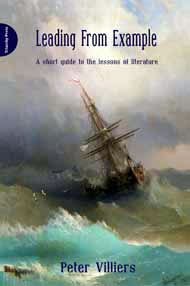Who really influenced your ideas on leadership: how to lead, how to be a good leader, how to do it better? And how to cope with the difficulties of leadership: the stresses, the demands, the betrayals and the failure?
We pick up ideas on leadership everywhere, not only from our own experience as both leaders and followers at home, at school, at work and at leisure, but from the experiences of other people of which we learn at second hand. Fiction is a fertile source of that learning, and an inexhaustible source of challenges to us. Novelists, short-story writers, playwrights and poets address leadership issues in such a way as to greatly expand the reader’s awareness of what it is to be a leader, and how to cope with the difficulties – physical, emotional, intellectual and spiritual – that must arise.
Sometimes the example seems so strong as to be almost first-hand – as if the people in a play, a story, a novel had become part of our experience, and we had shared their lives. It is a mark of good writing that the characters are individuals and not caricatures or stereotypes, and that there is an aspect of the universal to what is portrayed.
Leadership is about learning. How do people learn to be leaders? We began at home, and then at school, where we learned to follow before we might be called upon to lead; and those lessons will always be with us if they need to be revisited, reassessed and relearned as our lives progress.
Leadership is a practical art, and we may improve our own performance from considering the examples of others. Where are we to find such examples? In literature, I would argue.
Rudyard Kipling revisited his own schooldays in Stalky and Co., a tale of boarding school and what three dissatisfied and rebellious adolescents learned there. What they absorbed was not on the official curriculum, and the lesson here explored in depth is Kipling’s rejection of indoctrination – in this case, the preaching of a politician’s patriotism.
Lord Jim, by Joseph Conrad, is the story of an idealistic young officer in the merchant service who dreams of heroic feats. When the crisis comes, however, he fails the test; and the rest of the book is about how he tries to redeem himself, and how he handles the second and final challenge to his image of himself as leader and hero.
What is the ordinary person who is not an officer in the merchant service to learn from Jim’s example? We already know, in essence, what good leadership requires. The trick is in applying in practice the lessons that we have grasped in theory. Literature serves to expand our understanding of how others have sought to do so and to learn from their experience in its complete context, and not as presented in the facile dilemma of the standard textbook.
Leadership is a means to an end, and not an end in itself; and it is a shared enterprise. Consider the behaviour of Robert Jordan in Ernest Hemingway’s For Whom the Bell Tolls. Jordan is the explosives adviser to a guerrilla band in the Spanish civil war over whom he has no formal authority but who are very much in need of leadership. How is he to provide it? Jordan’s nationality, background and temperament distance him from the group, but he does not allow those factors to sabotage the mission.
Leadership requires a justified confidence in oneself and one’s own abilities, a confidence that falls somewhere between world-weary cynicism and foolish optimism.
The leader is resolute without being bombastic and is always human.
Leadership dilemmas will always be with us, and include a spiritual dimension, as Rabindranath Tagore recognised. It is a pleasure to find a book that embraces that dimension.








